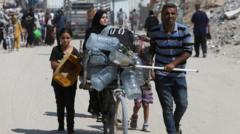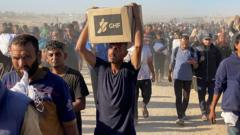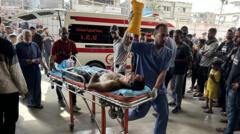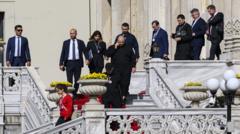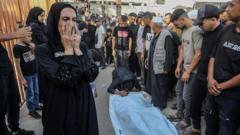In a significant but complex response to the US plan for a ceasefire in Gaza, Hamas has proposed the release of Israeli hostages in exchange for Palestinian prisoners but demands further amendments to the proposal.**
Hamas Proposes Hostage Release Amid Demand for US Ceasefire Revisions**
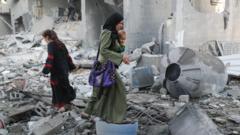
Hamas Proposes Hostage Release Amid Demand for US Ceasefire Revisions**
Hamas has offered to exchange Israeli hostages while seeking modifications to a US ceasefire initiative, emphasizing their conditions for a permanent truce.**
Hamas has put forward a counterproposal concerning the recently discussed US ceasefire plan, expressing willingness to release 10 living Israeli hostages, along with the remains of 18 deceased hostages, in return for a number of Palestinian prisoners. The group insists on essential amendments to the American proposal which include calls for a permanent ceasefire, a complete Israeli withdrawal from the Gaza Strip, and assurances for ongoing humanitarian aid delivery.
This response is neither a complete acceptance nor outright rejection of the US framework, which has received Israel's approval, according to Washington. Steve Witkoff, the US special envoy for the Middle East, denounced Hamas's response as "totally unacceptable," urging them to consider the framework for immediate proximity talks to potentially secure a 60-day ceasefire deal soon.
Israeli Prime Minister Benjamin Netanyahu’s office confirmed that while Israel is agreeable to the updated terms for the release of hostages, Hamas remains steadfast in its demands. As a designated terrorist organization by the US, UK, and EU, Hamas has reiterated its insistence on a comprehensive ceasefire and total withdrawal of Israeli forces from Gaza.
Facing immense pressure from within Gaza amid dire humanitarian conditions affecting 2.2 million residents, Hamas finds itself in a precarious situation. The organization is unable to accept a US proposal that is less beneficial than previous offers it has turned down, while they remain cognizant of Israel's plans to ramp up military offensives.
Despite the ambiguity surrounding the full details of the US ceasefire proposal, it reportedly involves a pause in fighting, a sequential release of hostages, and humanitarian aid facilitated through the UN. However, Israeli officials appear resistant to amend the terms to fit Hamas's requests, with Netanyahu remaining firm that military efforts will persist until Hamas’s military influence in Gaza is entirely dismantled.
Defense Minister Israel Katz highlighted the strident nature of the ongoing conflict by declaring that Hamas members "will be forced to choose" between accepting hostages' release terms or facing total annihilation. In response to the US envoy's statements, Hamas spokesman Basem Naim criticized the biased mediation approach that favors the Israeli stance, emphasizing the need for equitable negotiations.
Amidst this backdrop of rising tensions, the Hamas-run health ministry reported a recent surge in casualties, with 60 fatalities and over 284 injuries in a 24-hour period attributed to Israeli airstrikes. Since the onset of military action post-Hamas's initial attack on October 7, the organization claims approximately 54,381 deaths have occurred in Gaza, compounding the humanitarian crisis that faces its residents.






